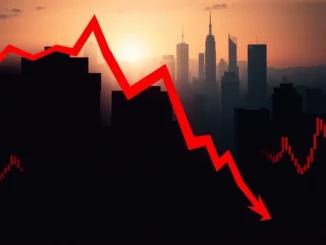
Hey crypto enthusiasts! While your primary focus is likely on the exciting world of digital assets like Bitcoin and Ethereum, paying attention to what happens in traditional finance, especially the US stock market, is crucial. Why? Because these markets don’t exist in a vacuum. Movements in stocks can often signal broader economic trends or shifts in investor sentiment that can eventually ripple into the crypto space. Recently, we saw some significant dips in major US indexes, and it’s worth exploring what happened and what it might mean.
Understanding the Latest US Stock Market Moves
Let’s get straight to the numbers that caught everyone’s eye. The major indexes representing the broader US stock market finished the day firmly in negative territory. This wasn’t just a small dip; it was a noticeable downturn across different sectors of the economy represented by these key benchmarks.
Here’s a quick look at how the three main indexes closed:
- S&P 500: Down 1.61%
- Nasdaq: Down 1.34%
- Dow Jones: Down 1.91%
These figures show a synchronized move lower, indicating that selling pressure wasn’t confined to just one type of stock or sector.
A Closer Look at the S&P 500 Performance
The S&P 500 is often seen as a bellwether for the overall health of the US economy because it tracks the performance of 500 of the largest publicly traded companies in the United States. When the S&P 500 moves significantly, it suggests a broad shift in investor outlook. The 1.61% drop here signals that sentiment turned cautious across a wide range of industries, from technology and healthcare to financials and consumer goods. Investors might be reacting to economic data, corporate earnings reports, or global events, leading them to reduce exposure to riskier assets.
What the Nasdaq’s Dip Tells Us
The Nasdaq Composite Index is heavily weighted towards technology and growth stocks. Its 1.34% decline indicates that the tech sector, which has often led market rallies, also faced selling pressure. This could be influenced by factors like rising interest rate expectations (which can make future earnings less valuable), concerns about tech valuations, or specific company news. Given the overlap between tech-savvy stock investors and the crypto community, the Nasdaq’s performance is often watched closely for signs of changing appetite for innovation and growth-oriented assets.
Analyzing the Dow Jones Industrial Average
The Dow Jones Industrial Average tracks 30 large, publicly owned companies based in the United States. These are often referred to as ‘blue-chip’ stocks – established, stable companies. The fact that the Dow saw the largest percentage drop among the three indexes at 1.91% is notable. It suggests that even these seemingly safer, more traditional companies were not immune to the selling wave. This can indicate that concerns are broad and affecting even the most fundamental parts of the economy.
Connecting the Stock Market Decline to Crypto
Now, the big question for you: how does this stock market decline potentially affect your crypto holdings? The relationship between traditional markets and crypto is complex and evolving. Here are a few ways they can be linked:
- Risk-On/Risk-Off Sentiment: Both stocks (especially tech) and cryptocurrencies are often considered ‘risk-on’ assets. When investors become fearful about the economy or future uncertainty, they tend to sell riskier assets (stocks, crypto) and move into safer ones (like government bonds, cash). A significant stock market drop can signal a shift to ‘risk-off’ mode, potentially leading to selling pressure in crypto as well.
- Institutional Overlap: Many large investment firms and corporations now hold both stocks and cryptocurrencies. If they need to raise capital or reduce overall portfolio risk during a stock downturn, they might sell across all asset classes, including their crypto holdings.
- Macroeconomic Factors: The same economic news or central bank policies (like interest rate hikes) that cause stocks to fall can also negatively impact crypto prices. Both markets are sensitive to inflation data, employment numbers, and monetary policy changes.
- Investor Psychology: Negative news in one major market can dampen overall investor confidence and create a ripple effect across different asset classes, simply due to psychological contagion.
However, it’s not always a direct correlation. Sometimes, crypto is seen as an alternative or even a hedge against traditional financial instability, leading to decorrelation or even inverse movements. Understanding the nuances is key.
What Does This Volatility Mean for Investors?
The recent stock market decline highlights the inherent volatility in financial markets. For investors, both in stocks and crypto, this serves as a reminder that prices can move down as well as up. Challenges include navigating uncertainty and potential short-term losses. Actionable insights involve:
- Staying informed about macroeconomic trends.
- Considering your own risk tolerance and investment horizon.
- Diversifying your portfolio (though remember correlation exists).
- Avoiding making impulsive decisions based on short-term market swings.
Compelling Summary
In conclusion, the recent closure of major US stock indexes lower, with the S&P 500, Nasdaq, and Dow Jones all seeing significant percentage drops, is a notable event in the financial world. While this is traditional market news, its implications can extend to the cryptocurrency market through shared macroeconomic drivers, investor sentiment, and institutional portfolio adjustments. The stock market decline is a clear signal of cautious or negative sentiment among traditional investors. For the crypto community, understanding these movements isn’t about trading stocks; it’s about gaining insight into the broader financial landscape and potential factors that could influence the path of digital assets. Staying aware of these interconnected dynamics is part of being a well-informed investor in today’s global markets.



